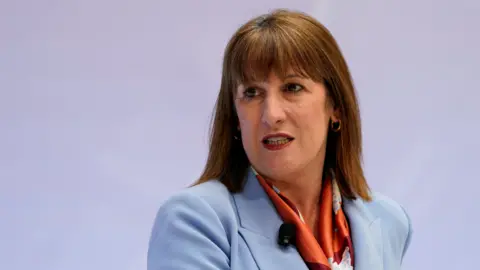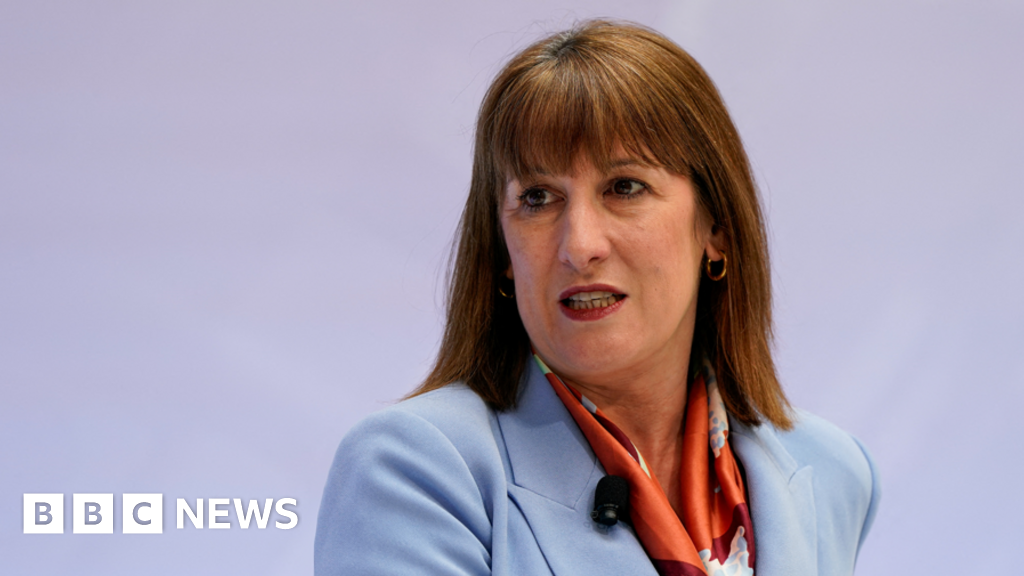Business reporter, BBC News
 Reuters
ReutersChancellor Rachel Reeves’ plan to cut billions of pounds in welfare costs through reforms has essentially gone up in smoke.
Following major government concessions on the benefits bill, a forecast £5bn in savings by 2029-30 has been severely dented.
Coming so closely after the U-turn on the Winter Fuel Allowance, the government has almost eliminated its £10bn buffer which it wanted to keep the public finances on track.
So what are Reeves’ choices now? As the Autumn Budget approaches, she has five options to change the financial situation.
1. Wait and see
The government could decide to wait and see if the UK economy grows by more than expected and debt interest costs fall.
That is a risky move.
Part of the reason why Reeves announced the welfare reforms in March’s Spring Statement was because higher debt interest payments and weaker tax receipts had more than wiped out her existing £10bn buffer.
Meanwhile, the Office for Budget Responsibility, an independent body which assesses the government’s spending plans and performance, halved its forecast for UK economic growth this year to 1%.
At that point, there was still great uncertainty over the impact of Donald Trump’s US tariffs.
Since then, the UK became the first country to strike a deal with Trump.
It has significantly reduced tariffs on areas such as cars, though a 10% tax still applies in some areas and a final agreement on UK steel shipments to the States has yet to be reached.
2. Find new savings
Reeves has literally just announced a Spending Review.
The big winners were the NHS, getting an extra £30bn a year, as well as defence.
Other departments fared less well or saw cuts.
Going back in and asking ministers to find more savings after just being handed their budgets would not only be disruptive but would make the government look like it is scrambling to regain credibility.
There is also a big question mark now over whether the government can afford to remove the two-child benefit cap.
Sir Keir Starmer said last month he would “look at” scrapping it, at a cost of £3.5bn.
3. Change the financial rules
This is a big no-no for Reeves.
When she became chancellor, Reeves set out two financial rules. The first was that day-to-day spending would be paid for with government revenue, which is mainly taxes. Borrowing is only for investment.
The second is that debt must be falling as a share of national income by the end of a five-year period.
Reeves has repeatedly said these rules are “non-negotiable”.
They are aimed at showing that the UK is financially stable after the country’s credibility was shaken by former Prime Minister Liz Truss’s mini-budget in 2022.
Theoretically, Reeves could alter the rules – they are self-imposed – but that risks rattling markets and if that happens, debt interest payments could rise.
4. Less frequent financial checks
The OBR produces two assessments of the UK’s economic and financial outlook a year, coinciding with the Autumn Budget and the Spring Statement.
The International Monetary Fund (IMF) has suggested that the OBR report should be limited to just once, at the Budget.
The IMF reckons one assessment would “promote further policy stability” and potentially reduce the pressure on the government’s buffer figure, which is often referred to as “headroom”.
It said that even “small revisions to the economic outlook can erode the headroom within the rules, which is the subject of intense market and media scrutiny”.
Prior to the mini-Budget, Truss and her Chancellor Kwasi Kwarteng shunned the OBR when they announced £45bn in unfunded tax cuts, which unnerved financial markets.
Since then, Reeves has introduced a new law which means that any government announcement that makes major changes to taxes or spending is subject to an assessment by the OBR.
To limit a report to once a year, she could choose to limit what she sets out in the Spring Statement to just providing an update on the state of the economy.
5. Increase taxes or extend threshold freeze
Labour has pledged not raise taxes for “working people”, ruling out increases to employee National Insurance Contributions, Income Tax and VAT.
On Wednesday, cabinet minister Pat McFadden said the government would stick to that promise but he admitted that there would be “financial consequences” to the decision to water down planned welfare cuts.
That leaves Reeves with few levers to pull to replenish the government’s coffers.
One option is to keep a freeze on tax thresholds in place for longer. The policy, introduced under the Tory government, was due to end in April 2028.
If Reeves extended it until the end of the parliament, it could bring in nearly £7bn.
In reality, this is a tax rise on working people – if your pay rises, you risk being dragged into a higher tax threshold. However, it would be a big fix for a government in desperate need of one.


